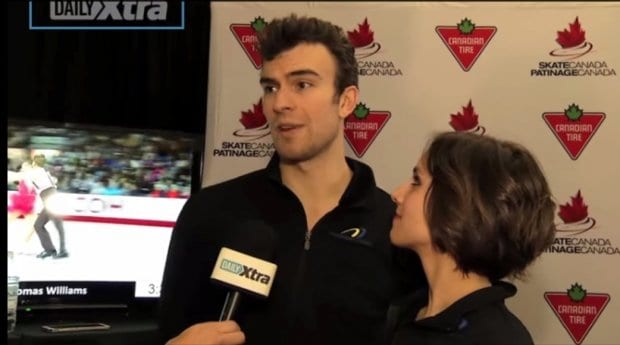While many societies worldwide are becoming increasingly gay-friendly, the sports world seems to be lagging, says Olympian Marion Lay.
Responding to statistics recently revealed in Out on the Fields, the first international survey on homophobia in sport, Lay says she isn’t surprised that homophobia is still present in the sport community, but she is somewhat taken aback by how pervasive a picture the statistics present.
“I think society was much more closed and everybody was in the closet when I was growing up, so sport was very similar,” says Lay, who represented Canada as a competitive swimmer at the 1984 and 1986 Olympics.
“Over time, though, society has changed but sport, from these stats, definitely hasn’t,” she says.
According to Out on the Fields, 65 percent of all Canadian participants believe homophobia is more common in sports than in other facets of Canadian life.
Eric Radford, a Canadian pair figure skater and 2015 World Champion, says he isn’t surprised at all by the study’s results.
“When I was younger, even if I went to a high school hockey game, there’s a specific masculine energy. People have a couple drinks and can get rowdy and in that type of environment, as a gay person, it always caused me to feel some insecurity,” he says.
A quarter of the gay men who participated in the study said they did not play youth team sports, many of them citing negative experiences in their physical education classes or a fear of being rejected due to their sexuality.
According to the survey, Canadian gay men reported the highest rates of physical assaults and bullying in sports.
Lay attributes part of the problem to the conservative nature of traditional sports.
“I think there are a few places that are based on really traditional male values, and really cater to men and to the achievements of men. The military, the church, and sport are all very conservative and based on tradition,” she says. “I usually think that tradition means acceptance of discrimination.”
While the study reveals discrimination against men in sports, it also shows Canadian lesbian youth are “more likely to be in the closet than in any other country and were the second most likely to report physical assaults.”
When Radford decided to publicly come out, he says, he thought people might not care because figure skating is not a popular major league sport.
“It’s more of an artistic sport and already has the stereotype that all male figure skaters are gay, which isn’t true,” he says.
Radford came out during his best season, right before winning the World Figure Skating Championships. This made him the first openly gay competitor to win a medal at that competition.
“When I was first talking about it, it felt great,” he says. “And then the day it was supposed to be released I had mini panic attacks throughout the day and felt terror and anxiety.”
Radford worried that he had eliminated potential opportunities by revealing his sexuality.
Gay professional athletes need more support when trying to mediate their sexuality with their profession, he says.
“When you’re at a really high level of sport you’ve already made so many sacrifices to get there,” he says. “I bet there’s players out there who think this is just another sacrifice you need to make.”
Radford is now an ambassador for the Canadian Olympic Committee’s #OneTeam initiative. Partnered with the You Can Play campaign to welcome gay athletes, PrideHouse Toronto, and Egale, the initiative launched in December 2014 aims to promote equality and inclusion and support LGBT athletes in schools nationwide.
Of the six main countries surveyed, Out on the Fields ranked Canada first overall, though its inclusion score was only 148 out of a possible score of 500.
Watch our video with Eric Radford and his figure skating partner, Meagan Duhamel, after the pair won their fourth Canadian championship in January 2015, just weeks after Radford came out.
Editor’s note: The following quote from Eric Radford was amended on June 2 to correctly read: “It’s more of an artistic sport and already has the stereotype that all male figure skaters are gay, which isn’t true.”


 Why you can trust Xtra
Why you can trust Xtra


